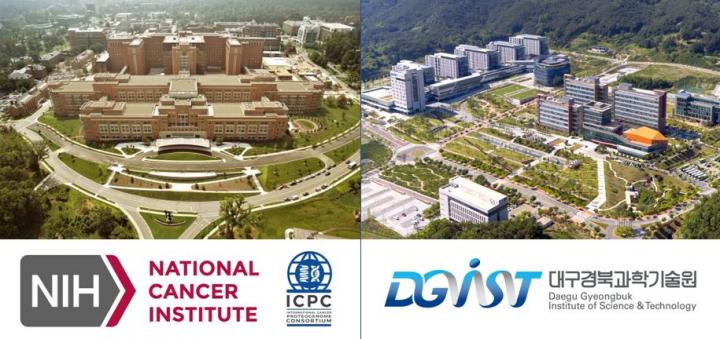DGIST, NCI, and Kyung Hee Univ. signed a joint research agreement for clinical proteogenomic cancer research

Credit: DGIST, NCI
DGIST announced that DGIST and Kyung Hee University signed a joint research agreement with the National Cancer Institute (NCI), USA for collaborative research on cancer. The MOU focuses on the collaboration of all three parties on cancer proteogenomic analysis and research technique, taking a step closer to conquering cancer.
The key points of the agreement are ? sharing of proteogenomic research techniques of international standards ? sharing of proteogenomic data analysis and interpretation protocols ? sharing of cancer tissue treatment methods and research details ? collecting and sharing proteogenomic data; and the parties decided to set up a system of close cooperation.
Cancer accounts for a huge portion of mortalities. According to the survey carried out by the Statistics Korea, last year, cancer was the most prominent cause of death in Korea. Cancer is also one of the leading causes of deaths worldwide and can be found in all age groups, including infants and adolescents, which have increased social costs exponentially.
To this end, the International Cancer Proteogenome Consortium (ICPC) was established in 2016 within the NCI centering on the USA to achieve the common goal of humanity, the conquering of cancer. ICPC is a consortium that expanded the Cancer Moonshot, a cancer conquest project established while current US President Joe Biden was Vice President, into an international collaboration. At the time, the Obama Administration invested approximately 1 billion USD (equivalent of 1.2 trillion KRW) in this consortium for research on cancer.
Currently, 33 research institutes of 13 countries are officially participating in ICPC. DGIST became the fourth official member institute of ICPC in Korea through this agreement. It signifies DGIST as the leading figure in the field of cancer proteome research, marking DGIST?as the first case among the four institutes of science and technology(IST) of Korea.
Through this, both DGIST and Kyung Hee University are expected to successfully study the treatment of triple negative breast cancer, lung cancer, and incurable cancers alongside research on the generation of cancer proteogenomic big data and the standardization of integrated multi-omics analysis.
Professor Min-Sik Kim of the Department of New Biology at DGIST, who successfully led the agreement, said, “There will be active exchange of key research and researchers through close collaboration with the proteogenome researchers around the world participating in this consortium,” and added, “Through collaboration, we will carry out world-class research and play a central role for the realization of precision medicine in the near future to contribute to the prosperity of all people.”
Professor Kwang Pyo Kim of the Department of Applied Chemistry of Kyung Hee University said, “Participation in ICPC internationally proves the excellence of Korea’s genome and proteome analysis skills and integrated data generation capability,” and further added, “International joint research, led by the Korean research team, will accelerate the conquering of lung cancer through the integrated analysis of data on new basis and analysis of Korean people’s lung cancer genome/proteome data for overcoming lung cancer.”
Meanwhile, this agreement was concluded through the research called, ‘Overcoming Incurable Cancer through Multi-omics Analysis of the Traceable Precision Medicine Research Resource Cohort’ of the ‘Omics-based Precision Medicine Technology Development’ project of the National Research Foundation of Korea.
###
Media Contact
Kwanghoon Choi
[email protected]
Original Source
https:/




